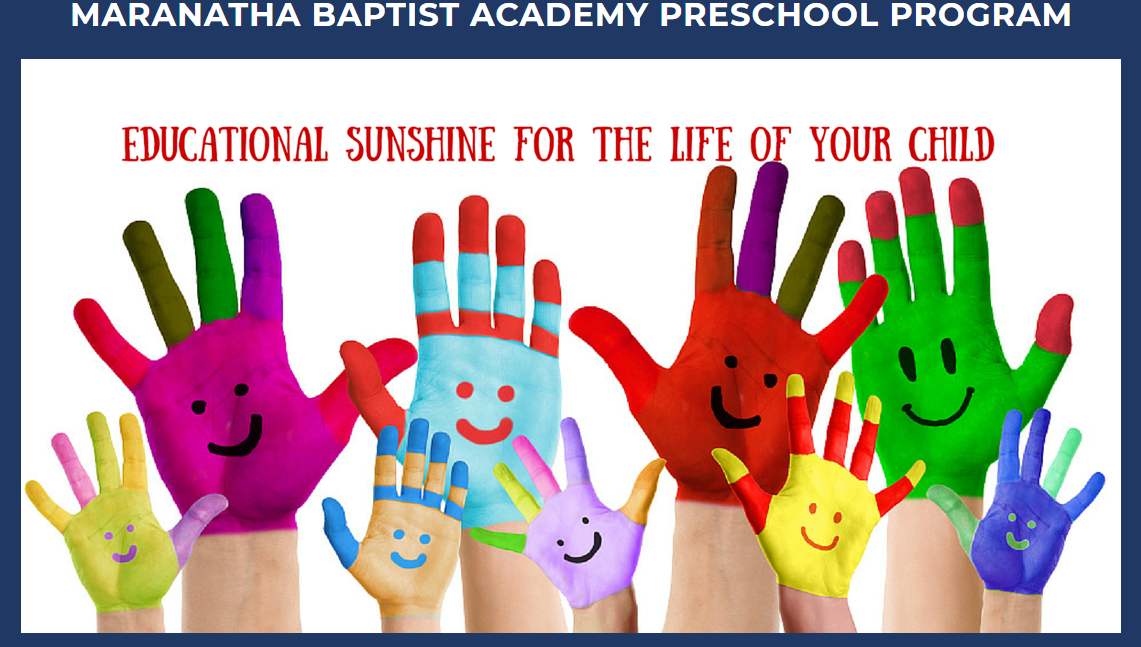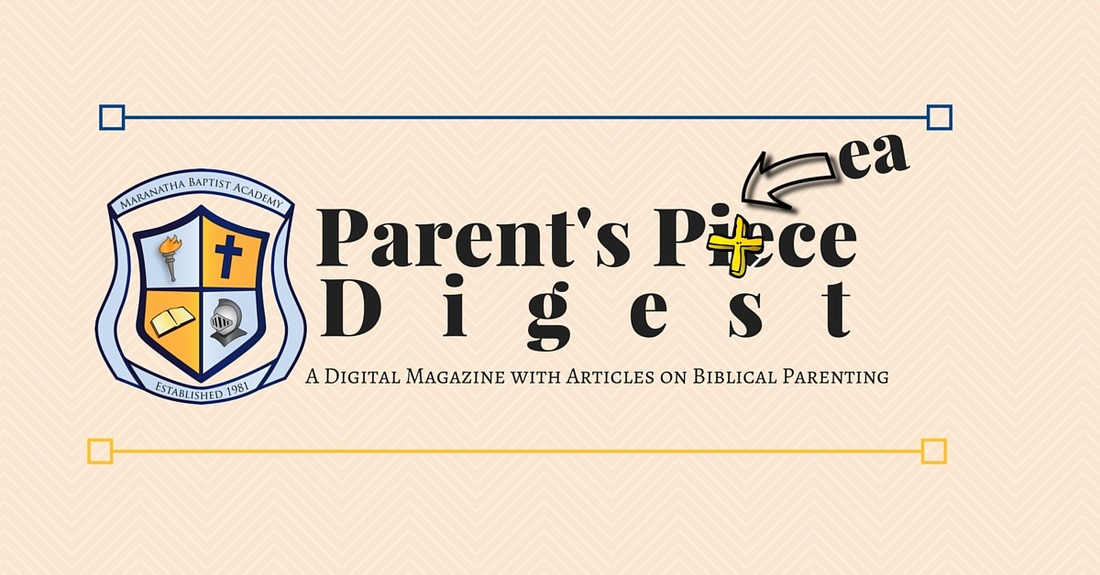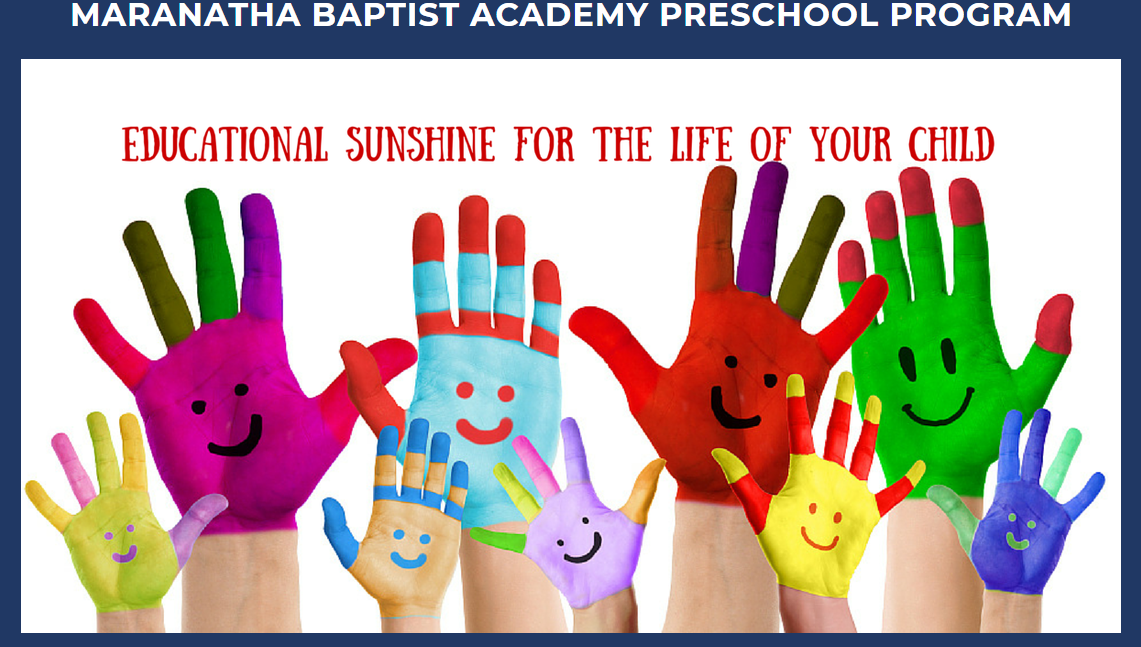|
At Maranatha Baptist Academy, we understand the importance of finding the right education for your children. We know that this is a decision that is not taken lightly by godly parents. We want to help. We have worked to compile the right questions to ask when choosing a Christian school. We've included the type of answers you should hear at a high quality institution. We hope these will be helpful to you as you consider your options and we hope you'll consider visiting us too. Regarding Spiritual values What observable outcomes of faith and practice do you want to see in your students? How do you observe them? Are certain denominations or practices promoted or restricted? The best practice answer you should hear: The idea of “observable outcomes” is important. Of course a Christian school wants “godly, Christ-honoring” graduates. But how do they measure their success? Do they know what percentage of their graduates go on to Christian colleges? (Granted, that is not God’s will for every student.) How many are involved in churches of like faith five years after graduation? Regarding Peer climate Are students respectful toward each other and toward the adult staff? Are they kind? The best practice answer you should hear: If you are enrolling a student in kindergarten . . . you need to attend a high school athletic event. At least visit the cafeteria during high school lunch time. In these less structured moments, the behavior and attitudes of students indicate something about what the school really produces. Caution: you may be seeing the exception or the newcomer, but observe. Regarding Personal outcomes What kind of character does the administration hope to develop? The best practice answer you should hear: The term servant leadership is a very good answer, but it has become trite. Consider the following analytical questions. What kind of character awards are important here? (These may be awards like “servant leader,” or “student of the year” (or week, etc.), or “most valuable player” in sports.) What is required to earn that recognition? . The follow-up is what you are working toward: Tell me about some students who have earned that award recently. If these questions seem helpful in your search, we invite you to download our free guide with these questions and 11 more essential questions to ask as you consider Christian school options for your children. We will also give you the best practice answers that you should hear. In addition, you'll benefit from 10 suggestions to consider when selecting a Christian school. This helpful guide has been used by many families in their decision-making process. We hope you'll find it beneficial too. You may also be interested in this article on Worldview...Click to Read or subscribe to Parent's Peace - A Weekly Publication to Help Parents raise Christian Children...
16 Comments
Family devotions are vital for moving our spiritual lives beyond the church walls and into an active, thriving faith. But what does it mean to have family devotions? Family devotions are a set time when husband and wife, or parents and kids, sit down, read the Bible, and pray together. It is a time designed to build up each individual and establish a sense of unity and direction within families. Being intentional about a devotional time and developing a family culture around that habit is important. Family devotions can initiate deep relationships with children and expand opportunities to pray with and for them. While it might require a shift in the way a family spends their time, scheduling family devotions can yield eternal dividends in a family’s spiritual growth and legacy. Unless we as parents have established a devotional discipline in our personal lives first, having family devotions can feel awkward or overwhelming. But the desire to begin having personal devotions can become a model for our children as we actively pursue a relationship with the living God. Our own commitment to Bible reading and prayer speaks volumes about the importance we, as parents, place on our own spiritual development. If it is something we grow into with our children, then there is a wonderful journey ahead. Transparency and perseverance are key! The goal is to raise children who remain devoted to God as adults. Our desire is to raise children who use prayer, God’s Word, and the solid core of family, friends, and church community to guide their decision-making, their life goals, and their relationships. God instructed the nation of Israel, "And these words that I command you today shall be on your heart. You shall teach them diligently to your children, and shall talk of them when you sit in your house, and when you walk by the way, and when you lie down, and when you rise" (Deuteronomy 6:6–7). In Ephesians 6:4 Christians are told, "Fathers, do not provoke your children to anger, but bring them up in the discipline and instruction of the Lord." Clearly, parents are to teach their children about God and His ways. Engaging with God together as a family, through prayer and Bible reading, is a great way to do this. In doing family devotions, we not only instruct our children but model behaviors that support spiritual growth. Many times, in teaching children we find ourselves challenged in our faith. Family devotions are good for the spiritual growth of all in the family. In doing family devotions, focus on character development. Use passages relevant to family situations or needs. This allows children to understand that the Bible is applicable to our daily lives in the twenty-first century. It also helps them know that God is a concerned and loving Father who desires a personal relationship with them and that He is there with wisdom and guidance for their lives. As the children get older, it helps to connect doctrine and theology with life outcomes. Comparison with other faith systems helps them develop the analytical skills they will need as they and their faith mature. Aside from your set habit of family devotions, be watchful for God-given teachable moments. Such moments are rare, precious, and not subject to schedule. The times when your child asks a question or makes an observation are opportunities to share God’s love and care for him. You may not have all the answers at any particular moment, but you can let the child know he has been heard, his questions are important, and that you will explore the topic together. This opens the door to conversation and becomes a true, organic representation of our Ephesians 6:4 calling. Family devotions can be part of a wonderful journey together with God. It can cultivate an atmosphere that allows our children to flourish, especially when added to the support and nurture of larger communities of faith. Family devotions are a key to the blessing of James 1:25: “Whoever [families included!] looks intently into the perfect law that gives freedom, and continues in it—not forgetting what they have heard, but doing it—they will be blessed in what they do.” The above article is used with Permission from GotQuestions.org. Check them out for great answers to your questions. So, How Do We Have Family Devotions?Here are some ideas that will hopefully give you some inspiration to have family devotions together. Remember, try to be consistent, but don't get discouraged if you miss. Also, even if everyone can't (or won't) participate, you can still make this a meaningful time together. Simply pray together before bedtime. Discuss Sunday School lessons - Many churches offer a take-home guide with a Sunday lesson. If your church does not, ask the teacher what they are studying so you can help reinforce the subject at home. Act out a Bible story. Read through a good children's Bible. Discuss a Christian hymn or use hymn histories. - Many good hymn history books are available online. Enjoy a Christian movie or even Veggie Tales together and discuss biblical principles in the show. Find some good Bible games. Trivia, Bible hangman etc. Play the Ungame. It is a game that simply helps you ask good conversation starting questions which you can then apply Bible principles to. You can buy it on Amazon or see some questions here. Pray through a Psalm together praising God and asking God to fulfill promised outlined in that passage. Memorize a Bible verse together Get Keys for Kids and use this great devotional book for kids. It is free online, in email and even in your mailbox! Order it here As you can see, there are many ideas. Don't wait. Get started today. Will your child grow up loving God and loving people? How will he or she view culture, politics, hardships, and material wealth? How will your children interpret all they face in life? It all depends on worldview. For the Christian family, teaching a Christian worldview is paramount in the educational process. It undergirds everything else that is taught. It is one of the main reasons Christian education is so vital. What is a worldview? A worldview is the composite of all the beliefs and assumptions that direct how a person views life and, therefore, how a person chooses to live. Our most important beliefs relate to God. If people believe that God is merciful and gracious, that leads them to seek a relationship with God. If they believe that their god or “god-like important idea,” like evolution, is indifferent or cruel, they do not seek a relationship, but seek to appease that god or to find relief or happiness in something else. A worldview has innumerable other components:
“Worldview” is not just an abstract philosophical topic. It is practical. It makes a difference every day. A worldview does not just affect your child; in a very real sense it is your child. That last statement seems a little extreme, but I am not the first to say it. Proverbs 23:7 says, “As he thinketh in his heart, so is he.” Our “heart” is the seat of the thoughts (Genesis 6:5), the emotions (Genesis 6:6), and the will (Daniel 1:8). The heart is the place of belief and unbelief (Romans 10:9; Psalm 14:1). The biblical word heart is very much related to the word worldview. Thoughts, beliefs, and emotions shape the will, and the will is manifested in how we choose to live. God commands, “Keep thy heart with all diligence, for out of it are the issues of life” (Proverbs 4:23). Certainly, parents are charged to protect the hearts of their children. This is the essence of shaping their developing worldview. What does an individual’s worldview affect? Everything. OK, not quite everything, but most of the important things in life. Here are a few important areas that will be affected by your child’s worldview:
Jerry Wass, biblical counselor and Christian school administrator, says that you know that you have succeeded as a parent when you see your children raising their children for the Lord. Raising them “for the Lord” means helping them to develop a biblical worldview. How is a worldview developed? A worldview is not something that a child receives on his or her eighteenth birthday. It is forged one interaction at a time, starting before the child even understands words. By the age of five, the basic ideas are set, but they are continually being developed in further detail and revised by new input. There is a major time of reevaluation beginning in the teen years and continuing through the early 20’s. This is the time when the capacity for higher-level reasoning is coming to maturity. The individual reevaluates many of his or her assumptions about life and either solidifies them as his or her own or rejects them. This is a crucial time in each person’s life. How does Maranatha Baptist Academy help you shape your child’s worldview? First, we are third. The home is the primary institution for building Christian worldview. Ephesians 6 and Colossians 3 discuss the nurturing of children in the context of family. God works through His established lines of authority. The church is also established directly by God “for the perfecting of the saints . . . unto the measure of the stature of the fullness of Christ” (Ephesians 6: 12-13). These “saints” include the children of the congregation. But parents are allowed to call in helpers to the task. The main point of Galatians 4 is that the Old Testament law was designed to teach us our need for God’s grace. However, it makes that point by an analogy which assumes that the role of the “school teacher” is right and proper: Now I say, That the heir, as long as he is a child, differeth nothing from a servant, though he be lord of all; But is under tutors and governors until the time appointed of the father. Maranatha Baptist Academy will help you develop in your child a Christian worldview that will stand in this age which attacks those principles from every side. Here’s how:
Maranatha Baptist Academy exists for no other reason than to help parents train up their children in God’s way. That is, we are here to help you develop a Christian worldview in your child. We would enjoy being a partner with you in developing a Christian worldview for your children. Contact us for a visit. You can also download our Christian School Selection Guide below, which will help you ask the right questions as you visit various school options. More Parenting Resources from Maranatha Baptist Academy You may like...t would be sinful for me to send my children to a public school in America. I’m not saying it would be sinful for you to do so, but I could not do it with a clean conscience. Therefore, to do so would be sinful for me. My parents took great pains to ensure I received a distinctly Christian education, and I am doing the same for my children. Over my dozen years in Christian education, I interviewed a lot of parents and students. And I do mean a lot. I got to hear just about everything during that time. I heard every excuse a Christian parent could offer for NOT giving their children a distinctly Christian education. I pleaded with parents not to put their children in secular, government-run schools. I helped pick up the pieces after years of their kids attending public schools. And I heard eight popular reasons from Christian parents trying to explain why they were choosing to send their children to those schools. Over the years, I responded to them all. So I thought it might be helpful to write about them in the hopes that some parents may be weighing the value of a Christian education. MYTH 1: My child can be a light in a public school. Isn’t that what Jesus called us to be? He may have called you to be a light, but nowhere does he call your child to the task of cultural transformation. His instruction about letting the light shine was to his adult disciples whom he had specifically chosen and empowered for the task before them. As long as we are quoting Jesus, he also said that anyone who harms a child should have a millstone hung around his neck and be tossed into the sea. He clearly understood children should be protected from any and all who may harm them, physically or spiritually. Yet, many parents send their untrained children into a worldview battlefield every day, unprepared and unable to withstand the daily assault on their faith. Scriptures teach that there is time for training—when we are children—and time to be what we have been trained to be—when we are mature. “Train up a child in the way he should go, and when he is old, he will not depart from it” (Prov. 22:6). MYTH 2: My child will be a missionary in the public school system. If the light of a candle represents your student’s faith, consider this simple truth: every light needs oxygen to thrive—or even to survive. The public school system currently prohibits the oxygen of God’s truth. “Faith comes by hearing and hearing by the Word of God” (Rom. 10:17). On top of the oxygen-deprived environment, the state-mandated curriculum and procedures actively attack your student’s faith, creating a violent storm that threatens to extinguish the flame entirely. It’s like placing a lone candle in a sealed jar—in the middle of a hurricane! If it survives at all, the candle will likely burn out quickly. At best, it will burn weakly, a shadow of the flame it could have been. Why hope they survive when they can thrive in an oxygen-rich environment? MYTH 3: We can’t afford to pay for a biblical education for our child. Unfortunately, our current school-funding system does require that property taxes support the public schools whether you actually send your students to those schools or not. Thus, many parents who choose Christian education must pay twice. The reality, however, is that it’s not a question of if you will pay for your child’s education, but when you will pay for it. A parent who invests time, energy, and resources in a biblical foundation will reap the promises of God as the child continues as an adult in “the way they should go.” On the other hand, a parent who does not invest in a biblical foundation will often pay in life consequences, heartache, and trials as their child nears adulthood—and beyond. Lest we forget these Scriptures:
Most of what our kids learn is caught, not taught. Your child will absorb more from the people around them than from the actual textbooks and curriculum—for 7-8 hours every day. They will absorb it both from teachers—whom you tell them to listen to—and peers. “Bad company corrupts good morals” (1 Cor. 15:33). Every time. In a Christian education setting, your student will be surrounded by teachers, students, and other families who, while not perfect, share your faith in Christ. More than ever, we need to build authentic faith communities. In the public system, your student will be daily influenced by people who either do not want or are not permitted to live as if God were even relevant at all. MYTH 5: My student will not perform as well in a Christian school as in a public school. The two most significant factors to a student’s academic success have been well researched and documented: parental involvement and caring teachers. Most Christian education environments only partner with supportive and involved parents. Caring teachers are often second to none as they daily seek to disciple students in partnership with parents. These two factors alone are quantifiably proven to raise academic results. As long as a Christian education environment insists on quality from its teachers, your students will be well-positioned to succeed. MYTH 6: My children will trust what I teach them instead of what the public school teaches them. The most important lesson you will teach your child by sending them to a school where God is irrelevant is that—God is irrelevant. Although most Christian parents would never dream of sending a child to a school that would force them to publicly confess that God is dead, the public system accomplishes the same objective. By teaching students they can learn all they need for life apart from any thought of God, He might as well be dead. And they learn it all with your approval. Nothing is neutral. “He who is not with Me is against Me” (Luke 11:23). “The fear of the Lord is the beginning of wisdom, and the knowledge of the Holy One is insight” (Prov. 9:10). MYTH 7: My children will be isolated in a bubble in a Christian school. They won’t be ready for the real world. First, public school is not the real world. It is a forced learning environment from which God is excluded. That description does not fit a biblical definition of how the world really is. Second, students are like a young plant in a greenhouse. When it is younger, it must be protected, fed, and carefully cultivated. As it grows more mature, it can be exposed for seasons of time to the outside elements, although still under careful observation. Only when it has reached maturity is it able to enter the outside world and thrive. Likewise, students in a Christian education environment are protected quite a bit when they are younger. However, as they mature, they should be eased into understanding the different points of view they will encounter and the temptations they will need to resist. By the time they reach their later high school years, students should be exposed to just about every false teaching they will ever encounter on a college campus and beyond. As parents, we are called to be in the world but not of it. When we stand on the truth, we have no fear of falsehoods. For example, in the school I led, we taught a literal six-day interpretation of Creation based on the Genesis account. However, as our students matured, they learned of the different viewpoints within Christianity as well as the macro-evolutionary ideas that clearly contradict both Scripture and sound science. MYTH 8: My child is a gifted athlete and needs to attend a public school to get noticed. Sports scouts find talent wherever it may be. The list is long of professional athletes who attended Christian schools. Our school had graduated one professional basketball player by the time I had left. But we as parents must always remember to keep first things first. Nowhere in Scripture will you find a call to play sports professionally. We do find a call to do all that we do with all our might. Thus, a full athletic program with many options for students can be a good thing, but should not be the main thing. We give it 100% to please Christ. We play to win. However, sports are not, nor should they be, the most important thing at any school. We must refuse to follow the culture around us that seems at times to worship sports. We must intentionally choose to prioritize our focus based on the Worship of God. We play for Him—the One who laid His life down for us. “What does it profit a man, if he gain the whole world, but lose his own soul?” (Mark 8:36) Bill Blankschaen is a writer, speaker, blogger at Patheos, co-author of You Will Be Made to Care and author of A Story Worth Telling: Your Field Guide to Living an Authentic Life. Connect at FaithWalkers.com and @BillintheBlank on Twitter. This article originally appeared in The Renewanation Review® magazine. All Rights Reserved. Reprinted here by permission of Renewanation. For more information regarding Renewanation, visit renewanation.org.This article originally appeared in The Renewanation Review® magazine. All Rights Reserved. Reprinted here by permission of Renewanation. For more information regarding Renewanation, visit renewanation.org. More Articles and Resources for our Academy for Your Home By Dr. Josh Mulvihill BIBLE-CENTERED LIVING is supremely important in the lives of our children. Parents, grandparents, and educators have the responsibility to teach children to love the Bible and live according to God’s Word. Most parents teach children to ride a bike, maintain an automobile, and manage money, yet few parents train children to daily read and meditate on God’s Word. As a pastor, I encounter large numbers of Christians who have never been taught how to have a quiet time and do not read the Bible. As a result, biblical illiteracy is high, moral relativism is common, and doctrinal confusion is widespread. Open God’s Word and be blessed by truth and beauty, get captured by its depths and heights, and be captivated by the glorious God in its pages. The joyful experience of reading God’s Word is where great parenting and teaching begins. God tells us to “daily meditate” on His Word (Ps 1:2) as well as “hide God’s Word in our heart” (Ps 119:11). These commands apply to adults and children. Children cannot live according to God’s ways if they do not know God’s Words. Here are six ways to help your children develop a love for God’s Word. 1. Develop the habit of reading the Bible Your first priority is to spend time daily reading God’s Word. Deuteronomy 6:6-7 states, “These commandments that I give you today are to be on your hearts. Impress them on your children.” God’s progression in this passage is important. God’s Word is to be on your heart, and then it can be taught to children. Empty vessels have nothing to give. You cannot pass on to children what you do not have. You will not pass on a passion for Scripture if you do not treasure it your- self. You cannot train children to develop the skills to study God’s Word if you have not cultivated it in your own life. If you are a Christian educator, make sure that doing God’s work does not inhibit your time in God’s Word. Spending time daily in God’s Word needs to be your highest priority. 2. Practice family worship Family worship is the means of introducing children to the truths of Scripture and preparing children for the Christian life. The practice consists of reading Scripture as a family, prayer, and praise to God, often through music. God has given the father the role of spiritual leader, but both mother and father are to share in the biblical instruction of children (Eph 6:4; Prov 1:8). Consider a few practical thoughts: • Read the Bible, not someone’s thoughts about the Bible. Devotionals are helpful, but the primary source should be the Bible. My wife and I often read Psalms and Prov- erbs to our children. We choose passages based on what we are strategically teaching them. Proverbs is the one book of the Bible written to young people, and it should receive heavy emphasis in your home or classroom. • Read the entire Bible to children. The pattern of Scrip- ture is to teach children the deep truths of Scripture. Children were not excused when difficult topics were covered in the Colossian or Ephesian church. Children were present to be told to obey parents; and therefore, were taught everything contained in these two books. • Read briefly. Remember, they are children. The younger a child is, the shorter their attention span will be. Don’t expect your child to study the Bible like an adult. Try to keep your family reading concise and to the point, but meaningful. Ten minutes is a good amount of time to begin. A great resource is The Long Story Short by Marty Machowski. • Include children in reading and discussion. Your goal is to explain the Bible passage clearly and biblically, engage children in the process, and help them apply God’s truth to life. If family worship is not a normal habit in your home, do not be discouraged by the child who complains, does not answer questions, or tries to derail the time. Once the child learns that you are serious about reading the Bible on a regular basis, they will get into the routine of listening and responding. 3. Teach children core doctrines of Christianity Young people are unlikely to remain faithful to a faith they do not understand and cannot defend. Parents and Christian schools should teach children of all ages the core doctrines of the Christian faith with a zeal and consistency that follows the pattern of the Bible. In 2 Timothy 3:15 we read of Timothy, “From childhood you have been acquainted with the sacred writings, which are able to make you wise for salvation through faith in Christ Jesus.” Psalm 71:17 says, “Since my youth, O God, you have taught me, and to this day I declare your marvelous deeds.” The pattern of Scripture is for children of all ages to be taught the core truths of the Bible so that they will be firmly rooted in Christ and established in their faith (Col 2:7). The Bible clearly states what will happen to children when they are not well grounded in God’s Word. Here are three examples: 1. Children are taken captive by man’s ideas and deceived by human traditions (Col 2:8). 2. Children become rebellious and live a godless, unfaith- ful life (Ps 78:8). 3. Children grow up not knowing God or His great works (Judg 2:10). The following topics should be taught to children of all ages: The Gospel The gospel is the good news because it addresses our most serious problem. The gospel summarized: we have rebelled against a holy God that created us. God acted in Jesus to save us, and we take hold of that salvation by repentance of sin through faith in Jesus. Concerning the gospel, you should have a threefold aim that your children: (1) clearly understand it, (2) concisely explain it, and (3) confidently proclaim it. Big Picture of the Bible The Bible is not a random collection of people or events. It is a unified whole with one main storyline pointing to, revolving around, and fulfilled in Jesus. There are four major parts of the Bible: creation (Gen 1-2), fall (Gen 3), salva- tion (Gen 4 - Rev 20), and re-creation (Rev 21-22). As you read through the Old Testament, help children to see how it points to Jesus and His covenant of salvation. Jesus himself did this, “And beginning with Moses and with all the prophets, he explained to them the things concerning himself in all the Scriptures” (Lk 24:27). The primary aim of the Bible is to glorify God, and this happens in salvation and judgment found on every page of the Bible. Read and reread the stories of the Bible to your children with this in mind. Familiarize them with the main stories, people, and events of the Bible, but not in a way that detaches them from the overall storyline of Scripture. We should call our children to obedience to Jesus Christ and can use the heroes of the faith as models to imitate, but let our teaching not dissolve into moralistic instruction separated from the gospel of Jesus or the glory of God. “Children cannot live according to God’s ways if they do not know God’s Words.” Doctrine Doctrine is simply a word to describe what the Bible teaches. Paul challenges young Timothy to “watch your life and your doctrine closely” (1 Tim 4:16). Every child needs to under- stand the core doctrines of the Christian faith to grow into a man or woman with convictions to follow God. The two most critical doctrines for children to learn center on the Word of God and the Son of God. It is a mark of successful education to teach children the inerrancy, authority, and sufficiency of the Bible. Great schools train children to embrace the supremacy, exclusivity, deity, and Lordship of Jesus Christ. In addition, we must repeatedly, with greater depth as children age, teach topics such as: creation to counter evolu- tion, God’s design for marriage between one man and one woman to counter homosexuality, the reality of heaven and hell to counter the claim that death is the end of all existence, the atoning work of Jesus to counter the claim that all reli- gions lead to the same God, the Trinity, and the character of God, to name a few. 4. Give your child a Bible When my mother was dying of ALS, she asked me what I wanted of her possessions to remember her by. My mom had expensive jewelry, money, and things with worldly value, but the thing I wanted most was her Bible. My mom’s Bible is the physical expression of the greatest gift she ever gave me: a love for God’s Word. Her Bible is tattered and torn. Its pages are yellow and marked up. It was well used and well loved. I want you to give this same gift to your children. Purchase a high-quality leather Bible and personalize it for each child. Choose a full text, readable version that a child can use as they grow older. A good age to give this to a child is during their middle elementary years, between ages 8 and 10. Plan a special ceremony or meal around this event. Before giving the Bible to your child, underline or highlight passag- es you want to emphasize. Make notations in the margins, and write short notes of encouragement and affirmation. May your gift help your child love God’s Word and echo the Psalmist, “How sweet are your words to my taste, sweeter than honey” (Ps 119:103). 5. Teach children how to study the Bible During the early years of a child’s life, the parent is the one to feed the child spiritually. But gradually, this responsibility should be shifted to the child. For this to happen, parents must teach their child how to read the Bible. Children should be taught basic Bible study methods which include observation, interpretation, and application. This is known as inductive Bible study. Observation: “What does this passage say?” Observation is taking a close look at what is going on in the passage of Scripture. Correct observations are key to understanding the meaning of the text. We need to read the Bible thoroughly, slowly, and prayerfully to understand what God is saying. Interpretation: “What does this mean?” Interpretation is trying to understand the intent of the author. Interpretation is affected by the culture in which the author wrote, the biases we bring to the text, and the context in which the passage is found. We cannot understand a verse without understanding a chapter. We cannot understand a chapter without understanding the entire book. We should teach children to interpret Scripture with Scripture and to consult resources such as commentaries to best understand a passage. Application: “What does this passage require of me?” We come to the Bible for transformation, not simply infor- mation. God’s Word has the authority to tell us how to live. We train children to obey all God’s commands, not just the ones they like. Teach children that obedience is essential, not optional. 6. Provide Bible study tools for children Every child should understand how to use the following Bible study tools, which make great gifts. Commentaries A commentary simply explains the meaning and applica- tion of Scripture. Scholars spend great amounts of time studying the Bible. They write about their discoveries in commentaries. Scripture can be difficult to understand, so good commentaries are helpful for a young person to have. Bible Dictionary A Bible dictionary lists items by theme. Using this tool, young people will be taught to look up people, places, and themes of Scripture. Bible dictionaries help a person quickly learn about important and obscure people of the Bible or the meaning of a word. Children can also look up themes such as faith and learn more about the topic. Concordance A concordance is a catalog of the Bible. It lists every word by alphabetical order and tells where to find each word by listing references. It is extremely helpful if a young person wants to study a specific word or remembers a word in a passage but cannot remember the reference. Bible Atlas A Bible atlas will teach about the geography of the Bible, the location of cities, and the whereabouts of important happenings. For example, there is an Old Testament Jericho and a New Testament Jericho. This is helpful to understand. The Scripture writers purposefully write that Jesus walked up to a location. This is a geographical reference. It is helpful to know where a city is located to better understand a text. If you want to significantly influence the faith of children, then make it a priority to teach them to study and memorize the Bible. It is a lasting legacy to train a child to develop the spiritual habit of Scripture reading. This article originally appeared in The Renewanation Review® magazine. All Rights Reserved. Reprinted here by permission of Renewanation. For more information regarding Renewanation, visit renewanation.org. Other information you may find helpful:At Maranatha, we want to teach students who want to learn. We want to help parents develop a thirst for knowledge in their children. We want children to understand more and more about the world God has created and consequently discover how God wants to use them in the world. How can parents develop this thirst for knowledge and learning? Here are some tips we found in this excellent article. We hope you find them helpful. If we can be of help to you or your family, please contact us or schedule a visit to come see our school. By Karen Andreola A pudgy one ’n-a-half-year-old holds his toy telephone to his ear, listening intently to its stop-and-go tune. He presses a button, talks gibberish—impersonating his mother remarkably well. He toddles across the room with his phone to his ear like his mother who tidies the house with a dust cloth in one hand, her telephone in the other. I laughed when I saw it. The toddler is my grandson. Not only is he cute, but he also provides a good illustration. Curiosity and imitation are active in young children. Children are sponges, natural learners, eager learners, nosy and inquisitive. This is what the nineteenth-century Christian British educator, Miss Charlotte Mason, aimed to safeguard in her students. She took advantage of this child-nature by tailoring a method of passing along knowledge that keeps the doors of curious minds open. Here are seven tips I gleaned from Miss Mason for a happy, curious lifetime of learning. Tip #1: Choose individual books for general knowledge. An author with a special interest in his subject will write a book with juicy details—details left out of a typical textbook overview. Such a book has the power to open the doors of a child’s mind in ways no textbook can, because it may be full of facts, the same facts found in a textbook, but the information is presented in literary form, in a more palatable and memorable way. An example of an author who delivers facts through literary genre is Holling Clancey Holling. You can find his books in most public libraries. They have been around since 1926. A student, the average age of 10, will be intrigued by the combination of story, facts, illustration, and extraordinary detail. Paddle-to-the-Sea, Tree in the Trail, Seabird, and Pagoo are four of his titles. Add up the details and it might surprise you how they surpass those of a textbook. A wealth of such books is available on a myriad of topics. Freely and confidently use them as legitimate schoolbooks. Tip #2: Take advantage of the talking recourse. When a child enters a first-grade classroom, he is trained to sit still and be silent for long stretches of time. In the homeschool, he has more opportunity to chatter. Like tapping a sugar maple for its sap, Charlotte Mason took advantage of this talking recourse. She replaced the classroom lecture with reading aloud. The authors of well-written, carefully worded books were the teachers. She believed in a child’s ability to narrate (to tell back in his own words what is read to him) to be an amazing gift that every normal child is born with—and the best way to gain knowledge from books. To spark a narration, use a short but meaningful passage such as an Aesop fable, for example. To get the quiet child to say more, simply ask, “What else?” Over time, the skill and power of narrating will carry over beautifully to the student’s writing ability. Multiple-choice, fill-in-the-blank, and true-and-false tests do not facilitate writing. In the homeschool, we can replace these classroom conveniences and the teacher’s lecture with the intelligent chatter of narration from books. Tip #3: Do some science in the fresh outdoors. Lessons are only as long as they need to be in the homeschool. When one lesson is completed, the next is begun. With a student’s full attention, a string of lessons can be accomplished in nearly half the time of a conventional school schedule—and with no after-hours homework. Time is available for getting outdoors. Once a week, my children and I would take a nature walk for firsthand observation. We’d record a nature find with a sketch of it, be it insect, wildflower, bird, etc., and keep a field guide handy to identify it. The find might be as common as a dandelion, ant, pinecone, or robin. “Look, Ma, a butterfly landed on my sweater.” Nature poems abound. The time taken to choose a relevant nature poem to be copied into a Nature Diary is time well spent for English. Tip #4: Cultivate an appreciation for art and music. I home-educated my three children through high school. These now-adult children meet with friends who were not home-educated and are sometimes struck with how words call to mind different associations. In conversation, the name Leonardo was brought up in reference to a painting on a Christmas card. A friend blurted out, “Oh, I didn’t know Leonardo could paint.” She was referring to an American actor. My children thought this was funny. The sad part is that the friend knew nothing whatsoever about the Italian Renaissance artist, Leonardo Da Vinci. A simple way to become familiar with some of the world’s greatest works of art is to open the pages of an art print book. Art appreciation provides children a storehouse of beautiful or thought-provoking images. Charlotte Mason recommends we display six pictures of one artist’s works throughout a semester. Let the children look and look and then describe what they see. No fancy or expensive curriculum is needed. Music appreciation is just as simple. Pop in a CD of greatest hits of Bach, Vivaldi, Scott Joplin, or Gershwin. Play a composer’s music while you wash dishes, travel in the car, draw, or give the little ones a bath. Classical pieces and folk tunes are part of our cultural heritage. Art and music appreciation will inoculate your students against grotesque noise and images they are sure to stumble upon in their lifetime. Tip #5: Read history that has muscle. In the homeschool, we are free to look for heroes in history. History has much to teach us about the choices of mankind and the consequences that result. The sacrifices made, the human struggle for discovery, the perseverance of invention, etc. give us hope that there are people who care to make a contribution to the world, care about future generations. Who are these people? What did they believe? To keep history from being dull or flabby, its pages need to be inspiring. History with the muscle of right versus wrong will help children develop their own willpower to do what is right, to choose to follow God and to do it with all their might. We can highlight our history curriculum with “hero admiration.” The Bible, biography, and historical fiction can supply inspiring heroes whose virtues children may choose to emulate. “Character is king,” said Ronald Reagan. It was a priority with Charlotte Mason as well. Tip #6: Instill good habits of quiet discipline. The homeschool is an ideal place for instilling “habits of the good life.” Charlotte Mason tells us we can instill one habit in children at a time, keeping watch over those already formed. It is remarkable what routine and good manners will do for the atmosphere of the home. Saying “thank you” and “please,” sharing, taking turns, and waiting patiently can all become habit. Speaking the truth in love, using determination, counting our blessings, and remembering others in prayer are virtuous actions that do not need strenuous moral effort once they have become habit. A mother strives to be consistent. She knows a habit needs her watchful eye until it is formed. The greatest care will be at the onset. But once formed, the quiet discipline it brings is worth all the effort. Tip #7: Keep growing, Mom. To keep from feeling weary or overwhelmed, the home teacher can take part in what I call “Mother Culture.”® Homeschooling is a parent’s responsibility and noble pursuit, but children need to see that there is life outside of homeschooling. To dabble in an interest brings refreshment to a mother’s soul. How about rummaging in your closet for the red wool you purchased three years ago to knit that hat? Let the children see that Mom can take her own nature walk, sew a curtain, memorize a Psalm for Thanksgiving Day, go on a “field trip” with Dad, or enjoy any number of recreations of her choice that demonstrate to her children that life does not so completely revolve around them. Delicately pour into your cup diversions of the enriching kind—small portions yet regular servings. Keep growing into the person God is creating you to be. Your cup will overflow into the family circle. Karen Andreola is known by home educators by her groundbreaking book A Charlotte Mason Companion. Karen taught her three children through high school; studying with them all the many wonderful things her own education was missing. The entire Andreola family writes product reviews for Rainbow Resource Center. For encouraging ideas, visit her blog: momentswithmotherculture.blogspot.com. This article was originally published in The Old Schoolhouse Magazine. Reprinted with permission. Volume 7 Issue 2 - The Renewanation Review This article originally appeared in The Renewanation Review® magazine. All Rights Reserved. Reprinted here by permission of Renewanation. For more information regarding Renewanation, visit renewanation.org. Learn more about our School and Read other Articles...Most Christian parents have probably read books on Christian parenting, participated in a Sunday school class on biblical parenting, and have most likely spent a great deal of time in prayer for their children. Most Christian parents want to raise their kids “right” and they take steps to give their children opportunities to learn about God and be in fellowship with other believers. But how far should it go? A thorough examination of what God says about children (those who are of the age to be under their parents’ care and the maturity to need close guidance) reveals that God thinks much of children and has a plan for them, even while they are young. Four major themes can summarize this plan: God plans for children to 1) be brought to Jesus, 2) be protected, 3) be trained to be disciplined and responsible, and 4) be immersed in truth. There are many other ways this could be expressed, but consider these things carefully when you make decisions about your children’s education, environment, and influences. God’s Plan is for Children to Be Brought to Jesus One of the most familiar passages in Scripture concerning children is found in Mark 10:13–16. People were bringing children to Jesus so that He could touch them, but the disciples, in keeping with the culture, felt that children were not important enough for Jesus’ time and were trying to send them away. However, Mark recounts, “But when Jesus saw it, he was indignant and said to them, ‘Let the children come to me; do not hinder them, for to such belongs the kingdom of God’. . . . And he took them in his arms and blessed them, laying his hands on them.” Jesus wanted the children to be brought to Him and He wanted to bless them. That blessing came because they were led to Him. It is our responsibility as parents to see that our children are led to Jesus, whether we are holding their hands, or we put them into someone else’s hands. God’s Plan is for Children to Be Trained to Be Responsible and Disciplined Parents are warned that “folly is bound up in the heart of a child” (Proverbs 22:15) and are instructed to train them and discipline them (Proverbs 22:6; Ephesians 6:4). Children are commanded to obey their parents and listen to instruction (Proverbs 1:8; Ephesians 6:1-3). Studies have shown that the human brain does not fully develop until the mid-twenties (http://newsinhealth.nih.gov/2005/September2005/docs/01features_02.htm). Although there is a wide range of how much self-control and maturity is displayed by children and teens of all ages, it is a scientific fact that the brain is still growing and developing much longer than was thought prior to the twenty-first century. During this time, children need significant guidance and constant reinforcement. The end goal of all of this training is that we raise children who become adults who live for God’s glory and understand His ways—like Timothy, whom Paul instructed, “Let no one despise you for your youth, but set the believers an example in speech, in conduct, in love, in faith, in purity” (1 Timothy 4:12). It is important to note that Timothy was already an adult, old enough to be the pastor of a church; albeit a young pastor, he was not a child. Paul later reveals how Timothy had gained that wisdom: through the instruction of Scripture since his infancy (2 Timothy 3:14–15). God’s Plan is for Children to Be Protected One of the most poignant things Jesus said about children was when He called a child to him and told His followers that they should come to Him with the faith and humility of a child, then said, “but whoever causes one of these little ones who believe in me to sin, it would be better for him to have a great millstone fastened around his neck and to be drowned in the depth of the sea.” With so many clear admonishments in Scripture to avoid the influence of bad company (1 Corinthians 15:33, Proverbs 13:20; 22:24–25) and make no provision for the flesh (Romans 13:14) and the impetus of guiding and training children on the parents, there is a great responsibility given that must be seriously taken. When my firstborn was an infant, my doctor asked if she was sleeping on her stomach. I told him that she was, and that she didn’t sleep very well on her back. When he related to me the higher risk of SIDS (Sudden Infant Death Syndrome) in stomach-sleeping infants, I immediately began to train her to sleep on her back. I didn’t care if there were millions of babies who slept on their stomachs and that the risk was small. I had been given the knowledge, and with that knowledge came a responsibility. It was my responsibility to protect my baby, regardless of what she found most comfortable (and the discomfort I faced with a fussy baby). The same responsibility applies in how we protect our children from the risks we are warned of from God’s own spoken Word. God’s Plan is for Children to Be Immersed in Truth To be immersed in something means you are completely submerged in it or surrounded by it. It touches and affects everything you do, eat, breathe, touch, and think. This term is often used when describing a language-acquisition method. For instance, someone who wants to learn French and goes to live in France and is surrounded by French-speaking people will have much more success than those who take a French class a few hours a week and are otherwise surrounded by people who speak English. This idea of immersing children in the acquisition of God’s laws, His ways, and His character is introduced in Deuteronomy 6:5–7: “Hear, O Israel: The Lord our God, the Lord is one. You shall love the Lord your God with all your heart and with all your soul and with all your might. And these words that I command you today shall be on your heart. You shall teach them diligently to your children, and shall talk of them when you sit in your house, and when you walk by the way, and when you lie down, and when you rise.” Every directive concerning children is that they be in some way led, instructed, guided, disciplined, or protected. There are no directives concerning children, specifically, which have to do with evangelizing, teaching, or even being a light or an example. That is not to say that we shouldn’t be teaching children to do these things. These are exactly the things we should be teaching and modeling for them, and even allowing them to practice under supervision and protection, so that when they are adults, they can carry on the mission that they have learned since childhood. So, What is God’s Plan for Education? As with many things in life, there is no specific command or illustration in Scripture concerning school. Just as one can state that the Bible is not a science textbook, but it has sufficient material to draw conclusions about science, one can also state that the Bible may not be an education textbook, but there is sufficient evidence to draw conclusions about education. The logical conclusion is that God intended children to be immersed in learning about Him in an environment where they are protected and warned against that which opposes Him. In Bible times, this would have been in the home, the synagogue, or in an apprenticeship with another family that observed the same religious beliefs. In modern days, we have to look at our culture which requires a level of education that goes beyond knowing how to cook, garden, and sew (for girls), or how to apply one specific trade (for boys). God has placed us in this era and we can still apply His instruction to our current culture. In a Christian school, children have access to the level of education required to function in society and be trained to redeem that culture by being successful adults in a wide variety of trades or occupations. Parents have the power to choose a Christian school where their children will be led to Jesus by teachers who know and love Him. They can examine the textbooks and sit in on classes to ensure that their children are being immersed in truth through every subject and every learning opportunity. Parents can observe and will often find that children in Christian schools have much higher expectations to be responsible and self-disciplined as they are discipled and their hearts are drawn to Jesus. And finally, parents have the power to choose a Christian school where their children will be under the protection of Christian teachers who carry on the mission to teach and encourage students to obey God’s Word and make no provision for the flesh. Will there be bad influences? Will there be opportunities to sin? Yes, without a doubt. The beauty of this educational choice is that when you are not there to guide them through the temptations and influences, your (biblical) message is being reinforced, not rejected or ridiculed. In a good Christian school, the role of the parent as the primary authority in the child’s life is in its rightful place. Children need one message, not competing messages. Give your child the best opportunity to grow to be like Timothy, who was “wise for salvation through faith in Christ Jesus.” A Glimpse of How we Teach American HistoryThis is from our Thanksgiving article back in November, but it is a good example of how we teach history with a Biblical worldview and without removing the religious aspects of our American history. If you are concerned about how your child will be taught about history at our school, we think you'll enjoy this article.
www.gotquestions.org First of all, there are no perfect parents. Every parent makes mistakes. Some of us are too soft on the kids, some of us too hard on them. Some of us wish we had spent more time praying with our kids when they were younger and some wish they would have gone to church more with the kids. This is no time to blame yourself and feel defeated. If God is speaking to you about being a better Christian parent, the time to start is TODAY. If you need to ask forgiveness from your children, do so and then move forward with new plans and new purpose. Here are some specifics from the website GotQuestions.org. They have a lot of great answers about parenting. Check them out if you like what you see from them below. At Maranatha Baptist Academy, we consider parents as God's first line of resource as he works in your child's life. We work hard to partner with you to help you accomplish your Christian parenting goals. Click here to read our philosophy of education. We consider ourselves partners with you not only in the education of your child, but in the spiritual nurturing process. If you're looking for a Christian education alternative, we hope you will get in touch with us for a visit and download our Christian School selection guide mentioned below. Here's the article from GotQuestions.org Being a good parent can be a difficult and challenging venture, but at the same time can be the most rewarding and fulfilling thing we ever do. The Bible has a great deal to say about the way we can successfully raise our children to be men and women of God. As a good parent, the first thing we must do is teach them the truth about God's Word. Along with loving God and being a godly example by committing ourselves to His commands, we need to heed the command of Deuteronomy 6:7-9 regarding teaching our children to do the same. This passage emphasizes the ongoing nature of such instruction. It should be done at all times—at home, on the road, at night, and in the morning. Biblical truth should be the foundation of our homes. By following the principles of these commands, we teach our children that worshiping God should be constant, not reserved for Sunday mornings or nightly prayers. Although our children learn a great deal through direct teaching, they learn much more by watching us. This is why we must be careful in everything we do. We must first acknowledge our God-given roles. Husbands and wives are to be mutually respectful and submissive to each other (Ephesians 5:21). At the same time, God has established a line of authority to keep order. “Now I want you to realize that the head of every man is Christ, and the head of the woman is man, and the head of Christ is God” (1 Corinthians 11:3). We know that Christ is not inferior to God, just as a wife is not inferior to her husband. God recognizes, however, that without submission to authority, there is no order. The husband's responsibility as the head of the household is to love his wife as he loves his own body, in the same sacrificial way that Christ loved the church (Ephesians 5:25-29). In response to this loving leadership, it is not difficult for the wife to submit to her husband's authority (Ephesians 5:24; Colossians 3:18). Her primary responsibility is to love and respect her husband, live in wisdom and purity, and take care of the home (Titus 2:4-5). Women are naturally more nurturing than men because they were designed to be the primary caretakers of their children. Discipline and instruction are integral parts of being a good parent. Proverbs 13:24 says, “He who spares the rod hates his son, but he who loves him is careful to discipline him.” Children who grow up in undisciplined households feel unwanted and unworthy. They lack direction and self-control, and as they get older they rebel and have little or no respect for any kind of authority, including God's. “Discipline your son, for in that there is hope; do not be a willing party to his death” (Proverbs 19:18). At the same time, discipline must be balanced with love, or children may grow up resentful, discouraged, and rebellious (Colossians 3:21). God recognizes that discipline is painful when it is happening (Hebrews 12:11), but if followed by loving instruction, it is remarkably beneficial to the child. “Fathers, do not exasperate your children; instead, bring them up in the training and instruction of the Lord” (Ephesians 6:4). As a good parent, it is important to involve your children in the church family and ministry when they are young. Regularly attend a Bible-believing church (Hebrews 10:25), allow them to see you studying the Word, and also study it with them. Discuss with them the world around them as they see it, and teach them about the glory of God through everyday life. “Train a child in the way he should go, and when he is old he will not turn from it” (Proverbs 22:6). Being a good parent is all about raising children who will follow your example in obeying and worshipping the Lord. Used with Permission - GotQuestions.org More from our Website that you may find helpfulHave you ever been yelled at as an adult? Maybe it was in traffic or when you accidentally spilled something on the big mean guy in front of you at a ball game. Whatever the situation, how did it make you feel? Did you feel your face get red? Were you embarrassed or angry? After the fact, even hours later, did you feel vengeful or keep thinking of things you could have or should have yelled back at the person? Now, rewind to the last time you yelled at your child. Do you think they feel much differently? Do you think raising your voice or using harsh words helps or hurts the relationship with young people?
The Bible says in Ephesians 4:29-32, “Let no corrupt communication proceed out of your mouth, but that which is good to the use of edifying, that it may minister grace unto the hearers. 30 And grieve not the holy Spirit of God, whereby ye are sealed unto the day of redemption. 31 Let all bitterness, and wrath, and anger, and clamor, and evil speaking, be put away from you, with all malice: 32 And be ye kind one to another, tenderhearted, forgiving one another, even as God for Christ’s sake hath forgiven you.” There is powerful truth in this passage regarding communication in general especially at home, but let’s focus for now on the word “clamor” in verse 21. The word comes from a word that means to croak (as a raven) or scream, that is, shriek, cry (out). This unfortunately describes most every one of us as parents at one time or another in the way we speak to our kids. We lose control because we had a long day, our kids get under our skin, they disobey or disrespect one too many times and instead of responding firmly in love, we respond firmly in anger, clamor and evil speaking. Instead of solving the problem, we makes it worse. Here are 10 suggestions for dealing with yelling and/or its aftermath. 1. If you’re guilty, make it right. If you know you’ve been wrong in this area, let your child know you were wrong, you feel badly about it and you are going to take steps to correct this issue. This may be difficult, but it will help you and your child. Make sure you also go to the Lord and ask for forgiveness and help as well. He will not only forgive us but strengthen us to overcome our sin. (I John 1:9) 2. In addition to making it right, communicate with your child about the situation. Tell them in a way that fits their age and understanding that you struggle with anger and yelling at times. Let them know you are praying for victory and ask for their help. Let them know what actions on their part can cause you to struggle more. Don’t blame them or make them feel your sin is their fault (it’s not) but communicate that their actions do make a difference. 3. Give advance warning when possible to avoid the yelling. Let your child know that their actions are elevating your emotions in a negative way and that you feel like you’re going to explode. Let them know when possible that you both need to work to defuse the situation immediately. Let them know that you may need to walk away and cool down. Tell them that if you do that, it is your way of preventing a yelling episode. 4. Pray. Ask God right there in the heat of the moment to give you strength to control your words and voice. Step away and cool down if possible. 5. Envision a stage. God sees your actions, but imagine that a group of your peers or co-workers are watching you and your child on a stage. Would your yelling embarrass you in front of them? Perhaps it will help to envision them as being there. 6. Remember you are the parent. Yelling and sparring with words reduces your level of authority and respectability. You are the adult. Remember to act like one. When you yell, it makes it easier for your child to yell back because you seem more like a sibling or peer. 7. Memorize a passage of Scripture together with your child. Agree that it is wrong for both of you to participate in these sins of words and voice. A joint memorizing project will help with accountability and relationship building. Ps. 119:11 says, “Thy word have I hid in mine heart, that I might not sin against thee. You can simply “Google” “Bible verses on controlling your words” or “Bible verses on controlling the tongue” for some good suggestions. 8. Have your husband or wife help. Be accountable to someone regarding your words and voice. A husband or wife is perfect. If that doesn’t fit in your particular situation, ask your pastor, pastor’s wife or a close friend to keep tabs on you and ask how you’re doing weekly. Ask them to pray with you about the struggle. 9. Thank the Lord your child is safe and healthy. There have been times I felt myself becoming irritated with my child and feeling like exploding. It helped to envision them sick or hurting and thank the Lord that they were actually ok, safe and well. This filled me with more compassion and thankfulness which helped defuse the anger and tone down the situation. 10. Read a good book on Words. A new book is currently available by Paul Tripp called “War of Words.” You can order it here and watch a short helpful video here. So is there ever a reason to yell? Sure. Perhaps to get attention, to create urgency or emphasis, but yelling with sinful anger is never good. Like any sin, it always makes things worse. At Maranatha Baptist Academy, our faculty and staff are Christian parents too. We know what it is like to not always be the type of parent you want to be and we work at it just like you do. We also know the importance of nurturing a child in a godly way. Our goal is to partner with you and your family to help with your goal of raising well educated godly children. Learn more about our school. Maranatha Baptist Academy Receives accreditation. | Worldwide Leader in Education Awards MBA Full Membership
For immediate release - St. Robert, MO, May 24, 2012–Maranatha Baptist Academy Receives Official Notice of Accreditation from the Middle States Association Commission on Elementary and Secondary Schools. Aaron Carnahan, school administrator, states that this accreditation from the Middle States Association Commission on Elementary and Secondary Schools represents a great achievement for our school and a great benefit for our community, students and their parents. Maranatha Baptist Academy was awarded accreditation from the Middle States Association Commissions on Elementary and Secondary Schools (MSA-CESS) in May 2017. MSA-CESS sets the highest standards for determining and assessing a school’s strength and educational validity. Dr. Henry G. Cram, President of the Middle States Association Commissions on Elementary and Secondary Schools, stated in a congratulatory letter that Maranatha had been awarded “full and official membership” in the MSA-CESS until December 2021. He went on to say that “Regional accreditation is a landmark event in the history of any institution, one deserving of notice and appreciation by its community.” President Cram wrote, “On behalf of the Middle States Association, please accept sincere congratulations on the recognition of your school as an accredited member.” The Association’s website explains the profile of an accredited school such as Maranatha Baptist Academy. MSA-CESS describes an accredited school as one who:
Aaron Carnahan, School Administrator, on this achievement: “As a private Christian school, we are determined first to glorify God by striving for excellence in all we do. We were excited to go through the respected accreditation process of the MSA-CESS which helps us examine ourselves in light of educational standards of excellence. We are thrilled for our community, students and parents that an independent organization of their standing and legacy has validated the hard work, diligence, and dedication to excellence of our faculty and staff. I am thankful to be a part of such a dedicated team.” MSA-CESS has been helping school leaders establish and reach their goals, develop strategic plans, and increase student achievement for 125 years. They have over 2,700 accredited schools and school systems in 34 states and almost 100 countries around the world. Learn more about Maranatha Baptist Academy at www.MaranathaBaptistAcademy.com Learn more about all of our certified accreditations here. Learn more about MSA–CESS at www.msa-cess.org . Looking for a Christian Education alternative? Download our Christian School Selection Guide. **** If you would like more information about this topic, please contact Aaron Carnahan at (573) 336-5972. |
Author and EditorsFaculty or Staff Members of Maranatha Baptist Academy Archives
April 2024
Categories |
|
Maranatha Baptist Academy
TELEPHONE NUMBER
(573) 336-5972 PHYSICAL ADDRESS 200 Acorn Dr Saint Robert, MO 65584 |
MARANATHA BAPTIST ACADEMY
A MINISTRY OF MARANATHA BAPTIST CHURCH Learn More About our Church Here. Visit our Church Facebook Page Here Quick School Links: Prospective Parents Academics The Academy's Journal Parent's Peace Digest Student Life Calendar and Events Non-Discrimination Policy |
© Maranatha Baptist Academy - All Rights Reserved
Proudly Powered by Purpose Launch Advancement LLC










































 RSS Feed
RSS Feed





